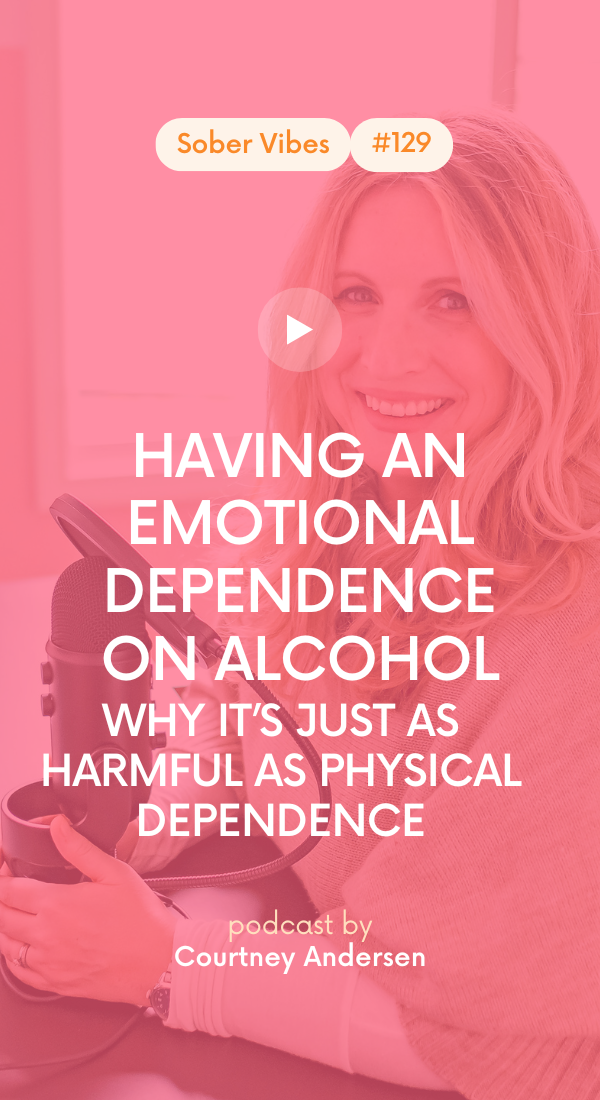Having an Emotional Dependence on Alcohol
May 11, 2023
Episode 129: Having an Emotional Dependence on Alcohol
Spotify | Apple Podcast | Google Podcast
"Just because you weren’t physically dependent on alcohol doesn’t mean your drinking is excused."

Here’s a glance at this episode...
Feeling like you need a drink to unwind, socialize, or face a tough day doesn’t always mean you’re physically addicted, but it can signal something just as serious: emotional dependence. In this episode of The Sober Vibes Podcast, we unpack what emotional dependence on alcohol really looks like, why it’s so normalized in our culture, and the hidden ways it can impact your life, relationships, and even your kids. You’ll also hear practical strategies for breaking the cycle and learning to regulate your emotions without reaching for a drink.
What you will learn in this episode:
- Emotional Dependence is real
- How we can't judge others just because we weren't physically dependent
- Handling emotions without alcohol
- Exploring the Dynamics of Emotional Dependence on Alcohol
Emotional Dependence on Alcohol: Why It’s Just as Harmful as Physical Dependence
When most people think about alcohol addiction, they picture physical dependence: the shakes, the cravings, the inability to go without it. But here’s the thing: you don’t have to be physically dependent on alcohol for it to have a grip on your life. Emotional dependence is just as real, just as harmful, and far more common than most people realize.
If you’ve ever reached for a drink to take the edge off after a hard day, numb stress, or feel “more social” at an event, you’ve experienced the pull of emotional dependence. And the danger lies in how normal it all seems, because everyone around you is doing the same thing.
In episode 129 of The Sober Vibes Podcast, I unpacked what emotional dependence really means, how it develops, and why it can be so tricky to recognize. Plus, you'll find four healthy ways to regulate your emotions without alcohol so you can finally break free from the cycle.
The Myth That It “Wasn’t That Bad”
"Just because you weren’t physically dependent on alcohol doesn’t mean your drinking is excused."
It’s tempting to minimize your drinking if you weren’t physically addicted. But emotional dependence can quietly run your life in the background, influencing your mood, your relationships, and your ability to cope with challenges.
We often search for relief, confidence, or escape at the bottom of a bottle, expecting it to fix something inside us.
But here’s the truth: what we were searching for in a bottle was never — and is never — going to be cured there.
How Emotional Dependence Creeps In
Unlike physical addiction, emotional dependence doesn’t announce itself with withdrawal symptoms. Instead, it builds slowly:
- You start using alcohol to “enhance” your good days and “get through” the bad ones.
- Social events feel incomplete without a drink in hand.
- Stress, boredom, loneliness...alcohol becomes the default solution.
Before long, drinking is less about enjoying a beverage and more about managing emotions you don’t want to feel.
Why Culture Normalizes It
From “mommy wine culture” memes to after-work happy hours, society constantly reinforces the idea that drinking is a normal, even necessary, part of adult life.
The problem? These messages encourage us to use alcohol as an emotional crutch and then make it harder to imagine life without it.
The Ripple Effect on Your Kids and Relationships
You may think, I’m not hurting anyone. But kids pick up on more than you realize. Seeing a parent regularly reach for alcohol to cope teaches them that’s how adults deal with stress or discomfort. And in relationships, emotional dependence can lead to misunderstandings, resentment, and distance.
The Trap of Comparison
"Your excuse to keep drinking can’t be that you can’t sit still — you have to figure out why and deal with it in a healthier way."
Comparing your drinking to someone “worse” is one of the easiest ways to stay stuck. The truth is, whether you drink once a week or every day, if you’re using alcohol to regulate your emotions, it’s worth addressing.
4 Ways to Regulate Emotions Without Alcohol
Breaking free from emotional dependence means finding healthier coping strategies. Here are four that work:
- Find a new hobby — something that challenges your brain and keeps your hands busy.
- Practice breathing techniques like box breathing or the Wim Hof method to calm your nervous system.
- Get support — join a free group, work with a therapist, or hire a coach who understands sobriety.
- Move your body — walks, workouts, yoga, boxing, or martial arts all help release built-up stress and emotions.
Final Thoughts
Emotional dependence isn’t a sign of weakness. It’s a sign you’ve been coping the only way you knew how. But now you can choose differently. You can stop looking for answers in a bottle and start building a life where you don’t need alcohol to get through the day.
When you recognize emotional dependence for what it is, you can finally break free, and that’s where real freedom begins.

Thank you for listening!
If this episode has helped you, please consider rating and reviewing the podcast. (Five Stars is awesome!)
This helps me continue to make episodes for you.
★★★★★
Please Rate, Review and Subscribe to the Sober Vibes Podcast.
Resources mentioned in this episode:
Click here to listen to episode 129 of the Sober Vibes podcast.
I want you to feel sober NOT boring!
Kickstart your sobriety with my free 2-day video workshop series to master your sober mindset and have FUN in your sobriety journey!








